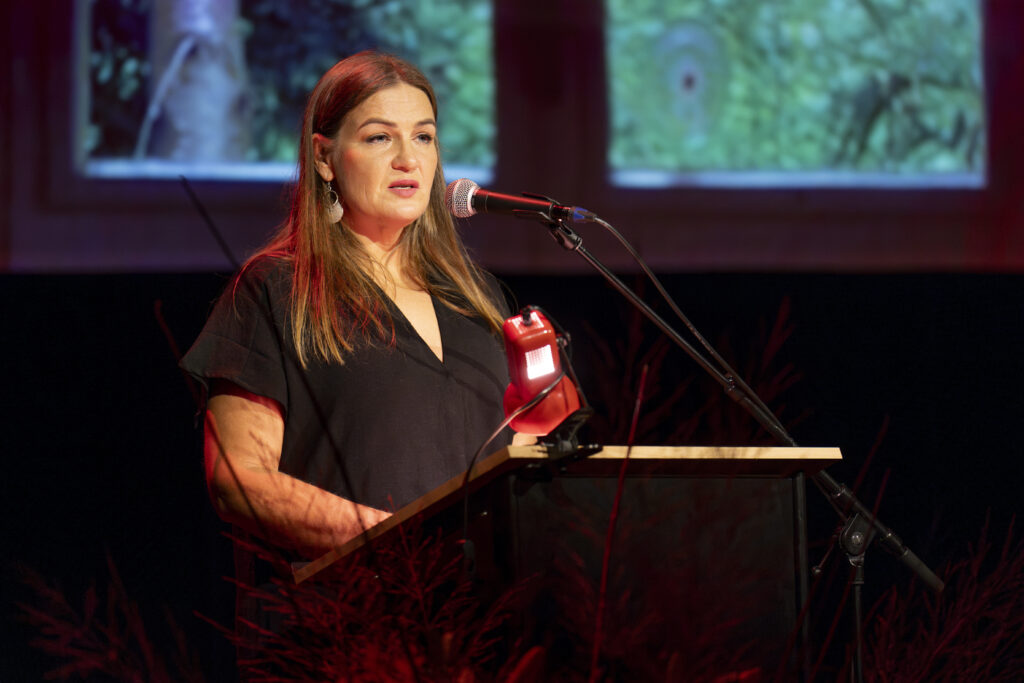
Foto: Urs Bucher/ubupix.com
Paula Weremiuk, Paul Grüninger Preis 2023
«Let me please share some stories with you tonight»
Good evening Ladies & Gentlemen. It’s my great honor to be here with you all. Let me please share some stories with you tonight.
I live in Poland in a small cottage in the countrysite at the edge of the Primeval Bialowieza Forest, just about 10 kilometers from the Belarusian border. My generation was marked by the terrible evens of the IIWW. Stories about it I’ve heard from my grandma are still alive with me. Personally, I’ve always been moved by the history of Jews during those times. That’s why the attitude and actions of Paul Grüninger are so meaningful to me.
In September 2021 suddenly I heard about refugees from Middle East and Africa hiding in the nearby forests of our border. At first, I couldn’t believe it. For me, peace and happiness meant a small house in the countryside, for them peace and happiness meant running away from war, famine or ethnic persecution. I wasn’t able to close my eyes to their fate of being exposed to such difficult circumstances, hunger, violence, push backs and death at the border of my own homeland. My first step was to mark my house with the green light – the symbol of helping refuges. But soon that wasn’t enough.
Tonight I’d like to tell you about just three people of many I’ve met in the woods while providing humanitarian help. In the beginning of the crisis, together with a friend I went to support to a group of refugees. We brought them water, food, dry shoes and warm clothes. It was at night so we could only use the red flash light so that no one would see us. We had to be quick and quiet to not atract military or police attention. That night, for the first time in my life I saw a view that I only had known from war movies: wide open eyes and terrified look on one of the refugees face. It made my heart pound. I Still remember those eyes of a person who had to flee his country and now being in EU had to hide in the dark forest in order to protect his life. Saying goodbye to them he grabbed my hand, pulled me closer and with a desperation in his voice he was whispering: thank you, thank you, thank you. We both knew his life was in jeopardy.
One evening when I was in my bed and with a fever. My friend called me saying: Paula, are you well enough to get out of bed and pick us up from the forest? I went to pick them up and found out they had just provided help to a Kurdish woman who was pregnant and was dying. Later she and her unborn child passed away at the local hospital. Leaving behind a husband and five other children. Her name was Aveen.
Finally, just some time before today I provided aid to a 19 years old boy form Syria. For three days he was all alone in the Polish wild forest, totally wet, shivering from cold and fear, looking around with the eyes of a hunted animal. When he saw me he started to cry. He had been traveling with a group of 20 but they got attacked by some Polish man. The rest of group run away but this boy had a gun pointed at his head and a knife to his throat. The man stole all his money.
Three stories. First, right at the beginning of the humanitarian catastrophy and the last one – just few days ago. And between them, there have been thousands of people at the Polish Belarusian border. Thousands of people who have been sough after, caught by military forces and pushed back to Belarus. Many of them sick, with trench foot, hypothermia, digestive problems, cut wounds, broken limbs, beaten up, bitten by dogs, just to name a few. The distance they need to cover on foot is many kilometers in a very difficult terrain through the old natural forest full of deep swamps and fallen trees.
According to the numbers of just one of the humanitarian collectives called Grupa Granica, since August 2021 there have been support requests from around 17 thousand people (1 thousand children including), 9 thousand people were provided with aid. Nobody really knows how many push back have been done but the Border Guard’s reports say there over 28 thousands push backs. There are around 150 people missing and 52 were found dead – including one child and seven women. The real number of refugees crossing the Polish – Belarusian border is unknown. It’s impossible to count. All we know is that the refugees‘ situation is horrible and fight for their life is real. That’s why, as the local people and activists, we try to do as much as we can to minimize the amount of deaths and tragedy on the Polish Belarusian border.
Standing here today, I’d like to express my big words of thank to Paul Grunninger Foundation for this great honor of bein here with you in remebrance of Paul Grunninger. Your sensitivity and care for the refugees at the Polish Belarusian border is extremely important. Thank you for the care you’ve been constantly showing for those who are mistreated, misjudges and persecuted for various reasons. I receive this prize with a humble heart. And for all of us involved in carrying support and aid during this humanitarian crisis happening at our border, let this prize be a symbol of faith, hope and love.
Thank you very much.
Paula Weremiuk, 17. November 2023
